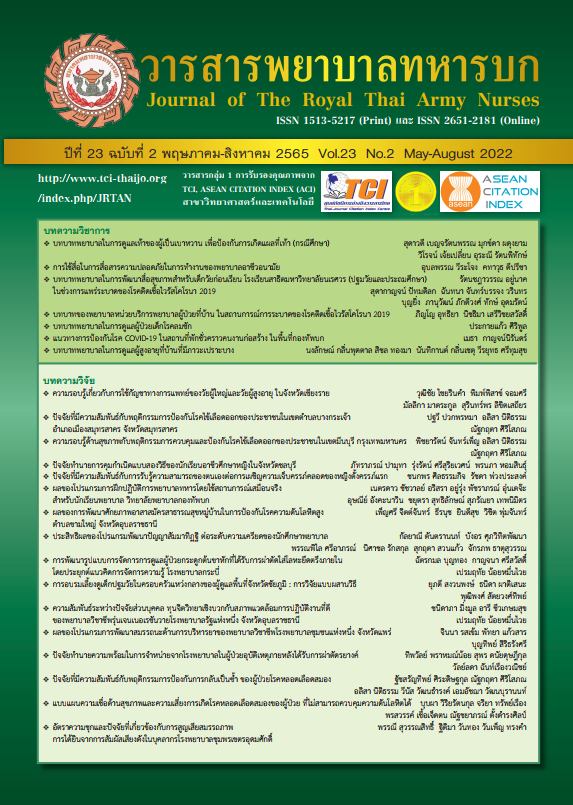Recurrent Stroke Prevention Behaviors among Stroke Patients
Keywords:
Recurrent Stroke Prevention Behaviors, Cerebrovascular Disease or StrokeAbstract
The purpose of this survey research was to study factors Related to recurrent stroke prevention behaviors among stroke patients. The sample was 100 people. Questionnaire was used as a research instrument in this study. Data analysis was made to descriptive statistics Pearson’s Product Moment Correlation Coefficient and chai-square test.
The results showed that the bio-social factors concerning age was found significantly related to recurrent stroke prevention behaviors among stroke patients at the .05 level. Perceived susceptibility, perceived benefit, perceived barriers, cues to action and perceived self-efficacy were also revealed relating to recurrent stroke preventive behaviors among stroke patients significantly at the .05 level.
Downloads
References
World Stroke Organization. Up again after stroke. WSO; 2018.
Bureau of policy and strategy, office of the permanent secretary, ministry of public health. statistical Thailand 2013.
Rungnapa C., Renu S. and Chuleeporn H., Care for Stroke Patients with a Multidisciplinary Team. Journal of The Royal Thai Army Nurse. 2017; 18 (suppl): 49-55. (in Thai)
Slark, J. Adherence to secondary prevention strategies after stroke: A review of the literature. British Journal of Neuroscience Nursing. 2010; 6(6), 282-286.
World Health Organization. The WHO STEP wise approach to stroke surveillance. Geneva: WHO; 2013.
National Stroke association. Recovery After Stroke: Recurrent Stroke. 2013.
PMK Stroke Center. Phramongkutklao Hospital.; 2018.
Wiriyakijpaiboon. J. Factors associated with adherence to secondary stroke preventionin stroke survivors. 2014; Master student of Nursing Science Program, Faculty of Nursing, Chulalongkorn University. (in Thai)
Sangsongrit. N. Predictors of Medication Adherence in Ischemic Stroke Patients. 2013; Master student of Nursing Science Program, Faculty of Nursing, Mahidol University. (in Thai)
American stroke association. AHA/ASA Guideline: Guidelines for the Prevention of Stroke in Patients with Stroke or Transient Ischemic Attack. American Heart Association and American Stroke Association National Center. 2014.
Tijayoung. S. The Factors Influencing Preventive Behaviors Amongst Risk Group Stroke Patients. 2014; Master student of Nursing Science Program, Community Nurse Practitioner, Christian University of Thailand. (in Thai)
Niratchara J., Wanpen P. and Vishuda C. Relationships among Age, Perceived Benefits of Health Behaviors, Perceived Barriers of Health Behaviors and Health Behaviors in Patients with Ischemic Stroke. Rama Nurs Journal. 2014; 20(2): 236-248. (in Thai)
Kachakod. J. Atherosclerosis prevention behaviors among Kasikorn Bank employees in Bangkok. Kuakarun Journal of Nursing. 2012; 19(1): 71-86. (in Thai)
Seetisan. P. Factors Associated with Self-Care Behaviors among Uncontrolled Hypertension Patients in Dokkhamtai Hospital, Dokkhamtai District, Phayao Province. Lanna Public Health Journal. 2013; 9(2): 120-136. (in Thai)
Siriyong. W. Prevalence of Stroke and Stroke Risk Factors in Kanchanadit Hospital. Region 11 Medical Journal. 2018; 32(1): 863-870. (in Thai)
Chaiwong N. and Bonkhonthod. P. Predicting Factors Preventive Behaviors for Coronary Heart Disease among Persons at Risk to Disease. Journal of Nursing and Health Care. 2019; 37(2): 6-15. (in Thai)
Thimayom. P. The Effect of Self-Efficacy Program on Self-Care Behavior of Hemiparesis Patients. Journal of Behavioral Science for Development. 2012; 4(1): 63-72. (In Thai)
Downloads
Published
How to Cite
Issue
Section
License
Copyright (c) 2022 Journal of The Royal Thai Army Nurses

This work is licensed under a Creative Commons Attribution-NonCommercial-NoDerivatives 4.0 International License.
บทความหรือข้อคิดเห็นใดใดที่ปรากฏในวารสารพยาบาลทหารบกเป็นวรรณกรรมของผู้เขียน ซึ่งบรรณาธิการหรือสมาคมพยาบาลทหารบก ไม่จำเป็นต้องเห็นด้วย
บทความที่ได้รับการตีพิมพ์เป็นลิขสิทธิ์ของวารสารพยาบาลทหารบก
The ideas and opinions expressed in the Journal of The Royal Thai Army Nurses are those of the authors and not necessarily those
of the editor or Royal Thai Army Nurses Association.






